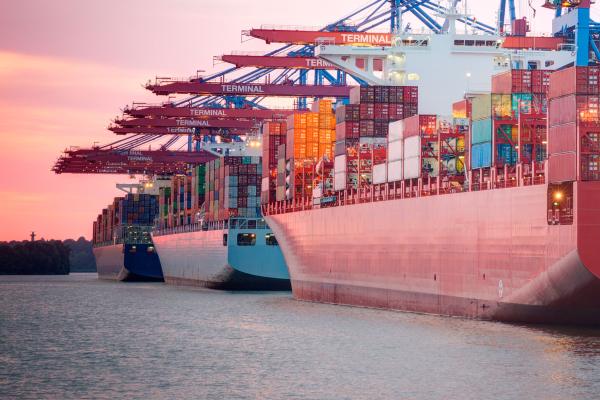Insights on International Trade & Investment
874 total results. Page 24 of 35.
Draft Guidance issued by the US State Department recommends that companies that export items with surveillance capabilities conduct human rights due diligence, and solicits feedback by October 4, 2019.
Soon, elected officials in Washington will be booking their return flights to the capital now that Labor Day has come and gone. After a torrid summer, the cooler autumn months ahead will be welcome news.
List 4A goes into effect, all Section 301 tariffs to increase by 5 percent, USTR deadlines loom, and the President orders American companies to “search for alternatives” to China sourcing. This is your end-of-summer Section 301 China tariffs roundup.

In recent years, the Committee on Foreign Investment in the United States (CFIUS) has taken a much stronger interest in the national security ramifications of sensitive data falling into the hands of foreign adversaries, including the sensitive personal data of American citizens.
The DoD, General Services Administration (GSA), and National Aeronautics and Space Administration (NASA) issued an interim rule amending the Federal Acquisition Regulation (FAR) to implement a key provision of the John S. McCain National Defense Authorization Act for Fiscal Year 2019 (FY19 NDAA).
Arent Fox LLP is pleased to announce the expansion of its International Trade practice with the addition of Counsel Matthew Tuchband.

The US Senate is poised to confirm Tom Feddo to run CFIUS as Assistant Secretary of the Treasury for Investment Security, increasing the bandwidth of CFIUS at a critical time in its history.
WASHINGTON — Fifty Arent Fox LLP attorneys have been rated as leaders in their profession by The Best Lawyers in America 2020.
On August 5, 2019, President Donald Trump signed an Executive Order (EO), freezing all assets in which the Government of Venezuela has an interest that are in US hands and prohibiting US persons from transactions with the Government of Venezuela, unless specifically exempted or authorized.
On Friday, August 2, 2019, the US State Department announced the issuance of another round of sanctions on the Russian Government in relation to the Chemical and Biological Weapons Control and Warfare Elimination Act of 1991 (CBW Act), which will go into effect on August 19, 2019.
On August 1, 2019, Trump posted a tweet that beginning on September 1, 2019, importers can expect a 10% tariff on $300 billion of Chinese goods.
Earlier this month, members of Arent Fox’s Export Controls & Economic Sanctions team published analysis in WorldECR that identified problems with the application of secondary sanctions.
At a press conference at the G20 Summit in Japan on June 29, President Trump said he will not lift current Section 301 tariffs on China, but also would not add tariffs on any additional Chinese imports “for at least the time being” as part of an agreement to resume negotiations with China.
On February 26, 2019, Darling Industries, Inc. (Darling) entered into a $400,000, 18-month consent agreement with the Department of State, Directorate of Defense Trade Controls (DDTC) to settle six alleged violations of the International Traffic in Arms Regulations (ITAR).
On June 20, 2019, the Office of the United States Trade Representative (USTR) published a notice outlining the procedure for requesting exclusions from List 3 of the Section 301 tariffs on Chinese imports via a new web portal.
Because of the length of time since China Section 301 duties were first imposed on July 6, 2018, many 2018 entries first covered by the duties are approaching their liquidation date (if they have not liquidated already).
The 2019 edition of Legal 500 US has rated 49 Arent Fox LLP attorneys as national leaders in their field. In addition, 15 of the firm’s practice areas were ranked among the best in the country.
The Department of Commerce, Bureau of Industry and Security (BIS), issued a final rule that added five recently developed or developing technologies that are essential to the national security of the United States to the Export Administration Regulations’ (EAR) Commerce Control List (CCL).
In response to the increasing numbers of illegal border crossers, primarily from the Central American countries of El Salvador, Honduras and Guatemala, crossing into the US along the US – Mexico border, President Trump has previously indicated he would “shut the border.”

The Committee on Foreign Investment in the United States is currently drafting the implementing regulations for the FIRRMA which was enacted this past August and represents the most sweeping set of changes to the processes and jurisdiction of CFIUS in its 44-year history.
A federal appeals court has delivered potentially good news for companies whose imported products US Customs and Border Protection (CBP) insists are within the scope of an ambiguous antidumping or countervailing duty (AD/CVD) order.
On May 21, 2019, the Office of the United States Trade Representative (USTR) published a Federal Register notice requesting comments on the proposed exclusion process for List 3 of the Section 301 tariffs on Chinese imports.
Between the addition of Huawei, the world’s largest telecommunications equipment maker, to the Entity List and a new EO declaring a national emergency related to information and communications technology and services, last week proved to be nonstop excitement for the export control world.

For these tariffs to become effective, the US Trade Representative will need to publish a final notice after public comment and hearing.
Yesterday, May 8, 2019, President Donald Trump issued an Executive Order (EO) authorizing broad new sanctions with respect to the steel, aluminum, iron, and copper sectors of Iran.